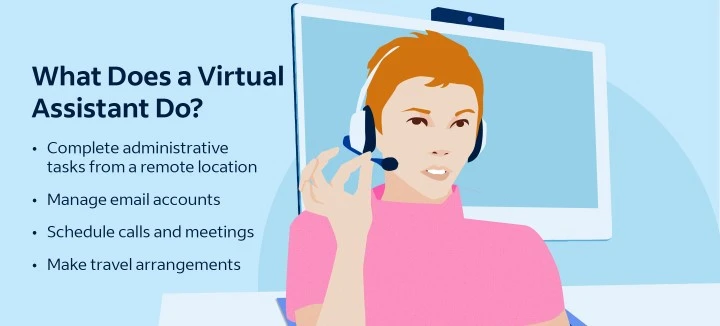
Virtual Assistant Services: Offering Administrative Support to Online Businesses
Business services
Introduction:
As the demand for remote work and online entrepreneurship continues to soar, the role of Virtual Assistant Services has become increasingly crucial. In today’s fast-paced digital landscape, where online businesses are flourishing at an unprecedented rate, efficient management of administrative tasks has become the cornerstone of success. Enter the world of “Virtual Assistant Services,” a transformative solution that has reshaped the way entrepreneurs navigate the complexities of running online enterprises.
Virtual Assistant Services, often abbreviated as VAs, are skilled professionals who offer a wide array of administrative support from a remote location. This support encompasses email management, appointment scheduling, data entry, research, and more. Essentially, they function as the backbone of online businesses, allowing business owners to focus on their core competencies while entrusting the intricate details to capable hands. This blog post aims to delve deep into the realm of Virtual Assistant Services, shedding light on their pivotal role in enhancing efficiency, reducing operational costs, and fostering growth in the online business sphere. Join us on this journey as we explore the myriad benefits, practical insights, and success stories that define the landscape of Virtual Assistant Services and discover how they can catalyze your online business into a well-oiled machine.

How do Virtual Assistant Services Revolutionize Online Businesses?
1. Benefits of Virtual Assistant Services:
Virtual Assistant Services offer many advantages for online businesses, making them an indispensable resource for entrepreneurs looking to thrive in the digital age.
- Cost Savings: Hiring in-house staff involves substantial expenses, including salaries, benefits, and office space. Virtual assistants work remotely, allowing you to reduce overhead costs significantly.
- Flexibility: Virtual assistants can be hired on a project basis or part-time, providing flexibility that suits your business needs. This scalability ensures you pay only for the services you require.
- Time Efficiency: Delegating time-consuming tasks like email management, data entry, and research to virtual assistants frees up your time to focus on strategic aspects of your business, such as growth and innovation.
- Access to Specialized Skills: You can find VAs with expertise in various areas, such as content writing, social media management, graphic design, and more, allowing you to tap into specialized talent as needed.
- Increased Productivity: With routine tasks off your plate, you can boost your productivity and concentrate on core business activities. This heightened focus can lead to improved business outcomes.
- Global Talent Pool: Virtual assistants can be located anywhere in the world, giving you access to a global talent pool. This diversity can bring fresh perspectives and ideas to your business.
- 24/7 Availability: Depending on your needs, you can hire virtual assistants from different time zones, ensuring your business operations continue around the clock.
- Scalability: As your business grows, you can quickly scale your virtual assistant team to accommodate increased workloads without the hassle of traditional hiring processes
2. Types of Administrative Tasks VAs Can Handle:
Virtual Assistants (VAs) are versatile professionals who excel at handling various administrative tasks, offering valuable support to businesses, entrepreneurs, and professionals across multiple industries. Here’s a closer look at the types of administrative tasks VAs can proficiently manage:

a. Email Management:
Virtual Assistants proficiently organize, filter, and categorize emails, ensuring your inbox remains clutter-free. They can promptly respond to messages, flagging urgent ones for your attention. This efficient handling of emails allows you to focus on critical tasks without missing essential communications.
b. Calendar Management:
VAs excel at scheduling appointments, setting reminders, and maintaining your calendar. Their organizational skills help you stay on top of meetings and deadlines, preventing scheduling conflicts and ensuring you make the most of your time.
c. Data Entry:
Virtual Assistants are skilled in accurately inputting, updating, and managing data in spreadsheets or databases. By entrusting them with data-related tasks, you reduce the risk of errors and free up valuable time for more strategic responsibilities.
d. Travel Arrangements:
VAs can expertly handle travel bookings, from flights to accommodations and itineraries. This streamlined approach makes business trips hassle-free, allowing you to focus on your journey’s purpose rather than logistics.
e. Research:
VAs are adept at conducting online research on various topics. Whether you need competitor insights, market trends, or potential business opportunities, they can gather and present valuable information to inform your decision-making.
f. Document Creation and Formatting:
VAs possess strong document management skills. They can draft, edit, and format documents, reports, presentations, and proposals to ensure a professional and polished appearance, leaving you with high-quality materials ready for use.
g. Customer Support:
VAs enhance customer satisfaction by promptly assisting with customer inquiries and resolving issues. Their timely responses and efficient problem-solving contribute to positive customer experiences, which are vital for business growth and reputation management.
3. How to Hire a Virtual Assistant?
Hiring a Virtual Assistant (VA) is a strategic move for many businesses but requires a systematic approach. Here’s a step-by-step guide to help you find, interview, and hire a VA:
- Define Your Needs: Start by clearly outlining the tasks and responsibilities you want your VA to handle. The more specific you are, the easier it will be to find a VA with the right skills and qualifications.
- Budget and Payment Terms: Determine your budget for hiring a VA and decide whether you’ll pay hourly, part-time, or on a project basis. Having a transparent payment structure is essential.
- Search for VAs: Explore online platforms like Upwork, Freelancer, or specialized VA agencies.
- Create a Detailed Job Posting: Craft a comprehensive job description with specific tasks, qualifications, and expectations. Make it clear if you require specific software or tools proficiency.
- Review Applications: Carefully assess applications and shortlist candidates based on their experience, skills, and references.
- Conduct Interviews: Start with initial interviews to gauge communication skills and availability. Conduct more in-depth interviews for shortlisted candidates and consider technical assessments if necessary.
- Check References: Contact the provided references to validate the candidate’s work history and reliability.
- Trial Period: To ensure a good fit, begin with a short-term contract or probationary period. This allows you to evaluate the VA’s performance without a long-term commitment.
Hiring a Virtual Assistant can streamline your workload and boost productivity. Still, it’s crucial to follow these steps to find the right match for your specific needs and ensure a successful working relationship.
4. Cost vs. Benefit Analysis:
Conducting a cost vs. benefit analysis is critical when hiring a Virtual Assistant (VA). This analysis evaluates the expenses of hiring a VA against the potential benefits they can bring to your business.
- On the cost side, you must consider factors such as the VA’s hourly or monthly rate, setup or training costs, and additional tools or software expenses. You should also factor in the time and effort required for onboarding and supervision.
- On the benefit side, assess the potential gains. These can include increased productivity, time saved for more strategic tasks, improved work-life balance, and the ability to scale your business more efficiently.
Ultimately, a well-executed cost vs. benefit analysis will help you determine if the investment in a VA aligns with your business goals and if the potential benefits outweigh the associated costs. This analysis is crucial in making an informed decision that can positively impact your business’s efficiency and growth.
5. Real Success Stories:
Real success stories involving the hiring of Virtual Assistants (VAs) illustrate the tangible benefits these professionals can bring to businesses. One notable example is that of a small e-commerce startup. By bringing in a VA to manage customer inquiries, process orders, and handle routine administrative tasks, the business owner gained precious time to focus on expanding their product line and marketing efforts. This resulted in a significant increase in sales and revenue. Another success story involves a busy entrepreneur who enlisted a VA to manage their email and schedule.
With this newfound support, the entrepreneur could allocate more time to strategic decision-making, resulting in the successful launch of a new product line and entry into new markets. These real-life examples highlight how VAs can alleviate operational burdens, enhance productivity, and contribute to business growth. By delegating time-consuming tasks to capable VAs, entrepreneurs, and businesses can achieve remarkable outcomes and position themselves for long-term success.
6. Outsourcing for Online Success:
“Outsourcing for Online Success” refers to the strategic practice of delegating specific tasks or functions of an online business to external professionals or agencies to achieve greater efficiency, scalability, and overall success. This approach allows companies to tap into specialized expertise while focusing on core activities. Outsourcing involves content creation, digital marketing, customer support, and administrative functions. By outsourcing these tasks to skilled professionals or agencies, businesses can benefit from cost savings, access to a broader talent pool, and increased agility in responding to market demands.
For instance, outsourcing content creation to experienced writers can result in high-quality blog posts or marketing materials, enhancing online visibility and engagement. Similarly, outsourcing customer support ensures timely responses to inquiries, improving customer satisfaction. Ultimately, outsourcing is a strategic tool that empowers online businesses to optimize their resources, maintain a competitive edge, and achieve success by concentrating on their strengths while leveraging external expertise to handle critical functions.
7. Overcoming Common Challenges:
“Overcoming Common Challenges” refers to identifying, addressing, and finding solutions for the typical obstacles and difficulties businesses face in their operations. These challenges in online businesses range from technical issues to organizational and strategic concerns. Here are some common challenges and ways to overcome them:
- Technical Challenges: Website downtime, slow loading times, and security breaches can harm your online business. Investing in robust hosting services ensures your site stays accessible and responsive. Security measures like firewalls and regular security audits safeguard your data and customer information. Continuous updates to your website’s software and plugins prevent vulnerabilities that hackers may exploit.
- Competition: In competitive online markets, standing out is crucial. Develop a unique value proposition that highlights what sets your business apart. Tailor marketing efforts to target specific audiences effectively. Exceptional customer service can create loyal customers who advocate for your brand, giving you an edge over competitors.
- Digital Marketing: Keeping pace with digital marketing trends takes time and effort. Ongoing education and staying updated with industry news help you adapt to changes. Outsourcing to digital marketing experts provides specialized knowledge and frees you to focus on core business activities.
- Customer Trust: Trust is the foundation of online success. Transparency in communication builds credibility. Secure payment options and consistently delivering on promises establish customer trust, encouraging repeat business and positive referrals.
- Scaling Challenges: Scaling a business presents operational hurdles. Efficient systems and processes streamline operations, making growth manageable. Consider outsourcing specific tasks to experts to maintain quality and efficiency as your business expands.
- Data Security and Privacy: Complying with data protection regulations is non-negotiable. Invest in robust data security measures, such as encryption and access controls. Educate your staff on privacy to minimize risks and safeguard customer data, ensuring legal and ethical data handling.
8. Future Trends in Virtual Assistance
Future trends in virtual assistance are poised to shape how businesses and individuals leverage remote support in the coming years. These trends reflect the evolving needs and capabilities of the digital era:
a. AI-Powered VAs:
AI integration will empower Virtual Assistants to tackle intricate tasks efficiently. They will harness AI’s capabilities for data analysis, natural language processing, and decision-making, delivering more innovative, data-driven insights. VAs can handle complex assignments and provide valuable recommendations, elevating their role beyond routine tasks.
b. Specialized VAs:
Virtual assistants will evolve into domain experts, catering to industries like healthcare and law that demand technical knowledge. These VAs will possess in-depth understanding and skills relevant to their niche, offering businesses highly tailored and industry-specific support.
c. Global Talent Pool:
The ability to tap into a global talent pool will remain a significant trend. Businesses will access VAs worldwide, offering diverse skill sets, language proficiencies, and round-the-clock availability, enabling efficient operations across different time zones.
d. Voice-Activated VAs:
As voice technology advances, VAs will become more accessible through voice-activated devices such as smart speakers and virtual assistants like Siri or Alexa. This seamless interaction will simplify task delegation and enhance user experience, integrating VAs into daily routines even more.
e. Task Automation:
Automating repetitive tasks will free VAs to focus on high-value activities like strategic planning and creative problem-solving. By handling routine workloads through automation, businesses can maximize the efficiency and productivity of their virtual assistant teams, ultimately driving better outcomes.
Conclusion:
In conclusion, virtual assistant services are experiencing a profound transformation, presenting boundless opportunities for businesses and individuals in the digital age. As we navigate the evolving landscape of remote support, it becomes increasingly evident that virtual assistants are more than just administrative aids; they are pivotal enablers of productivity, innovation, and efficiency. With the integration of artificial intelligence, specialized expertise, and global accessibility, virtual assistants are poised to elevate their role as indispensable partners in our professional endeavors. They are becoming more intelligent, adaptable, and capable of handling complex tasks, ushering in a new era of streamlined operations and data-driven decision-making.
As businesses and individuals harness the power of voice-activated technology and task automation, virtual assistants will seamlessly integrate into our daily lives, simplifying tasks and enhancing our overall experiences. These trends signify a paradigm shift and a revolution in leveraging remote support, promising a future where virtual assistants play a central role in our collective pursuit of online success and personal growth.
FAQs:
1. What is a Virtual Assistant (VA)?
A Virtual Assistant is a professional who offers remote administrative, technical, or creative support to businesses and individuals. They work remotely and handle various tasks to improve efficiency and productivity.
2. What types of tasks can I delegate to a Virtual Assistant?
VAs can handle various tasks, including email management, data entry, social media management, content creation, research, customer support, and more. The charges depend on your specific needs.
3. How do I find and hire a Virtual Assistant?
You can find VAs on freelance platforms like Upwork and Fiverr, through VA agencies, or by asking for referrals. To hire one, create a job posting, review applications, conduct interviews, and check references.
4. What are the benefits of hiring a Virtual Assistant for my online business?
Hiring a VA can save you time, reduce operational costs, improve efficiency, and allow you to focus on strategic tasks. They offer scalability, expertise, and flexibility.
5. How do Virtual Assistants handle data security and privacy concerns?
VAs are expected to adhere to strict confidentiality agreements and data protection protocols. Many VAs use secure communication and file-sharing tools to safeguard sensitive information.
6. Can I hire a specialized Virtual Assistant for my industry?
Many VAs have specialized expertise in various industries like healthcare, law, marketing, and more. You can find a VA with the specific skills and knowledge you require.
7. What trends are shaping the future of Virtual Assistant services?
The future of VAs includes AI integration, specialization in niche industries, access to a global talent pool, voice-activated technology, and increased task automation to enhance productivity.
8. How can I ensure effective collaboration with my Virtual Assistant?
Clear communication, setting expectations, using project management tools, and providing regular feedback are crucial to establishing a successful working relationship with your VA.
9. What is the cost structure for hiring a Virtual Assistant?
VAs can be hired on an hourly, part-time, or full-time basis. The cost varies depending on the VA’s experience, skills, and location. Some may charge a fixed project fee.
10. Are Virtual Assistant services suitable for both small and large businesses?
Yes, VAs can benefit businesses of all sizes. Small businesses can access expertise without hiring full-time staff, while large enterprises can scale their operations efficiently with VA support.
Reference Sites:
Here are some reference websites related to the topic of Virtual Assistant services and online business support:
- Upwork: Upwork is a popular freelance platform where you can find various Virtual Assistants with multiple skills and expertise.
- Fiverr: Fiverr is another online marketplace that offers freelance services, including Virtual Assistant services, often at competitive prices.
- Virtual Assistant Networking Association (VANA): VANA is a community and resource hub for Virtual Assistants, offering training, networking, and support.
- International Virtual Assistants Association (IVAA): IVAA is an organization that provides resources, education, and certification for Virtual Assistants.
- Belay: Belay provides Virtual Assistant, bookkeeping, and web support services for businesses and entrepreneurs.
- Time Doctor Blog: Time Doctor’s blog offers insights into productivity, remote work, and managing Virtual Assistants.
- Virtual Assistant Forums: This forum is where Virtual Assistants and those looking to hire them can connect, ask questions, and share experiences.
- The VA Handbook: This site provides guidance and resources for Virtual Assistants and those interested in hiring them.
- Virtual Assistant Tips, Tricks + Tutorials: This blog offers valuable tips and tutorials for Virtual Assistants, entrepreneurs, and small business owners.

